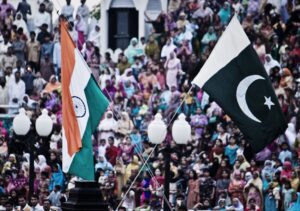 Context
Context
As the new government settles in Pakistan, in addition to the economy, one of the key questions is how it will handle the relations with its neighbors and extremism. Pakistan’s ties with India have always been tense, now Iran and Afghanistan have been added to the list. However, while the border with India is untraditionally calm, that cannot be stated for Iran and Afghanistan.
The most dramatic escalation occurred when Iran launched counter strikes for the terrorist attacks at the funeral of Qassem Soleimani on January 4 – not only in Syria and Iraq, but on January 16 on its nuclear-powered neighbor Pakistan, going after Jaish-al-Adl hideouts. These raids essentially connected the conflict that was mainly pestering the Middle East – to South Asia. Pakistan retaliated on January 18, by launching missiles at Baloch nationalist groups operating from Iran.
Barely two months after responding to the Iranian strike, Pakistan retaliated against extremists hideouts in Afghanistan on March 18 for attacks on its forces near its north-west border that killed 7 soldiers. Pakistan accused Tehreek-e-Taliban Pakistan (TTP) which takes refuge in Afghanistan, for the attack. The country also accuses Afghan Taliban for harboring TTP and alleges India’s intelligence agency, RAW, for funding and training them through Afghan proxies.
Stocking further tensions, India seized a Pakistan-bound cargo ship on January 23 for allegedly carrying materials usable for its nuclear program, which Pakistan refutes. The ship was travelling from China to Karachi and had stopped at Navi Mumbai’s Nhava Sheva port. This has been followed up by three coordinated strikes on Chinese interests in Pakistan when terrorists struck the Gwadar port, Turbat Naval base, and a convoy travelling towards Dasu dam resulting in the death of five Chinese workers. The Baloch Liberation Army claimed responsibility for the attack on a government facility in Gwadar and the naval base.
The recent incidents highlights Pakistan’s worsening relations with Afghanistan and Iran, which inadvertently benefit India’s strategic goals in the region. It pushes Pakistan to normalize ties with India. However, significant challenges remain in normalizing ties with India.
Analysis
New Government and India
The recent political changes in Pakistan, marked by Shehbaz Sharif’s ascension to the Prime Minister’s office and the return of Asif Zardari as President, have sparked renewed interest in the future direction of India-Pakistan relations. Both Sharif and Zardari, with past experiences of engagement with India, offer a glimmer of hope for resetting ties. During his previous tenure, Shehbaz Sharif expressed his desire for peaceful ties and later offered to open talks with India. While President Zardari, also known for his reconciliatory approach during his previous term in the office, earned a reputation for prioritizing peace with India.
After Shehbaz Sharif’s inauguration, Indian Prime Minister Narendra Modi extended his felicitations, reciprocated positively by Shehbaz. The US also added its expression of support for facilitating “productive and peaceful talks” between the two neighbors. Nonetheless, translating these aspirations into action remains a challenge. The path forward remains fraught with historical baggage, proxy wars, and the ever-present influence of hostile domestic politics.
The Point of Contentions
For Pakistan, the 2019 Indian revocation of Jammu & Kashmir’s special status stands as a significant issue. The country vehemently opposes this step, seeing it as a violation of Kashmiri rights and prior international agreements. Consequently, Pakistan halted its bilateral trade and downgraded diplomatic relations with India. As the trade suspension began to affect Pakistan’s economy, then Prime Minister Imran Khan briefly reinstated trade ties with India in 2021. However, political pressure led to a reversal of this decision. Meanwhile, India remains concerned about Pakistan’s ongoing support for Kashmiri separatists.
Prime Minister Sharif has conditioned any talks with India to the restoration of Kashmir’s autonomy, like his predecessor, while India demands Pakistan to stop cross-border terrorism before engaging in any dialogue. These conditionalities have created a seemingly insurmountable impasse. Furthermore, India’s success last year in securing a joint statement with the US which condemns Pakistan’s alleged role in terrorism further strained their relations. Pakistan rejects these accusations, instead terming India a state sponsor of terror for supporting groups like the Tehreek-e-Taliban Pakistan (TTP) and Baloch separatists.
Areas of Cooperation
Despite these tensions, some crucial steps highlight a commitment to de-escalation. For instance, both countries continue to adhere to a decades-long protocol of exchanging nuclear installation lists, showcasing their commitment to prevent nuclear war.
The ceasefire agreement along the Line of Control in Kashmir, albeit fragile, has been held for several years, marking one of the longest periods of relative calm in the region’s history. Even with severed diplomatic ties, Pakistan issued visas to Indian pilgrims in 2023, demonstrating a willingness to facilitate cultural exchange.
Both nations face numerous shared challenges, including climate change, air pollution, and water scarcity. Addressing these issues requires cooperation, not confrontation.
India, Iran, and Pakistan
The recent unprecedented incidents of cross border strikes Iran and Pakistan carried out at against each other has underscored the fundamental challenges Iran and Pakistan face in countering terrorism and highlights Indian role.
Both Pakistan and Iran have long accused each other of providing safe havens to their respective enemies. Pakistan consistently maintains that India’s intelligence agency, Research and Analysis Wing (RAW), is operating from Iranian soil, orchestrates attacks in Pakistan’s Balochistan region – and supports the anti-Pakistan Baloch separatist movement. Conversely, Iran blames Pakistan for its inaction against anti-Iran terrorist sanctuaries in the Balochistan bordering region, and for not taking decisive action against infiltrators into its territory through human trafficking and smuggling of weapons.
In 2016 Pakistan had arrested what it claims to be an Indian spy, posing as an Iranian businessman. There are different versions of how and where Kulbhusan Yadav was captured. Indian media had claimed, Kulbhushan was abducted by Jaesh al-Adl and handed over to Pakistan’s intelligence organizations. However, in a confession statement made under Pakistan’s custody, Kulbushan stated his main task was to sabotage CPEC (China, Pakistan Economic Corridor) and create unrest in Karachi and Balochistan. For this mission, he was in touch with leaders belonging to Baloch separatist groups. These dynamics indicate, India has been a player when it comes to regional proxy games involving Afghanistan and Iran and targeting Pakistan interests.
Future Expectations And Challenges
The future of India-Pakistan relations depends a whole lot on the outcome of India’s upcoming elections scheduled from April 19 to June 1 – and the posture the new government adopts. The Bharatiya Janata Party (BJP) heavily depends on anti-Pakistan rhetoric for its political campaigns and voter appeal. Offering an olive branch to Pakistan during election cycle would be viewed as political suicide. In fact, just before the last balloting in 2019, India had launched an air raid in Balakot, Pakistan, to rile up nationalist voter sentiments.
On the other hand, Pakistan’s powerful military establishment exerts significant influence over the nation’s foreign policy, and it has traditionally opposed rapprochement with India. Along those lines, Shehbaz Sharif’s reliance on the support from military establishment limits his ability to pursue a more conciliatory approach towards India. However, Pakistan’s economic predicament and dependence on IMF may change this outlook and necessitate peace with India. Additionally, Pakistan’s financial backer of the last resort, such as Saudi Arabia and UAE, have also expanded trade and security ties with India. This would further pressurize the new government to mend ties with its archrival.
The greatest challenge is likely going to be the absence of public narrative to pursue peace. For instance, the prevalence of hate culture and growing hostile political rhetoric especially in India – towards peace with Pakistan. Conversely, the new government in Pakistan lacks credibility, due to allegations of election rigging, to pursue any sensitive initiatives. Both nations would have to build public support if reconciliation is to ensue. And if Pakistan-India ties do not normalize, it’s likely the proxy-war being waged against Pakistan through Afghanistan and Iran would continue. India would want to keep Pakistan busy so it cannot pose a threat on the Line of Control (LOC) with India. This would also mitigate tensions with China on the Line of Actual Control (LAC), which many believe are designed to prevent India from projecting power towards the South China Sea.
PoliTact’s South Asia Fellow Naad-e-Ali Sulehria contributed to this piece.



